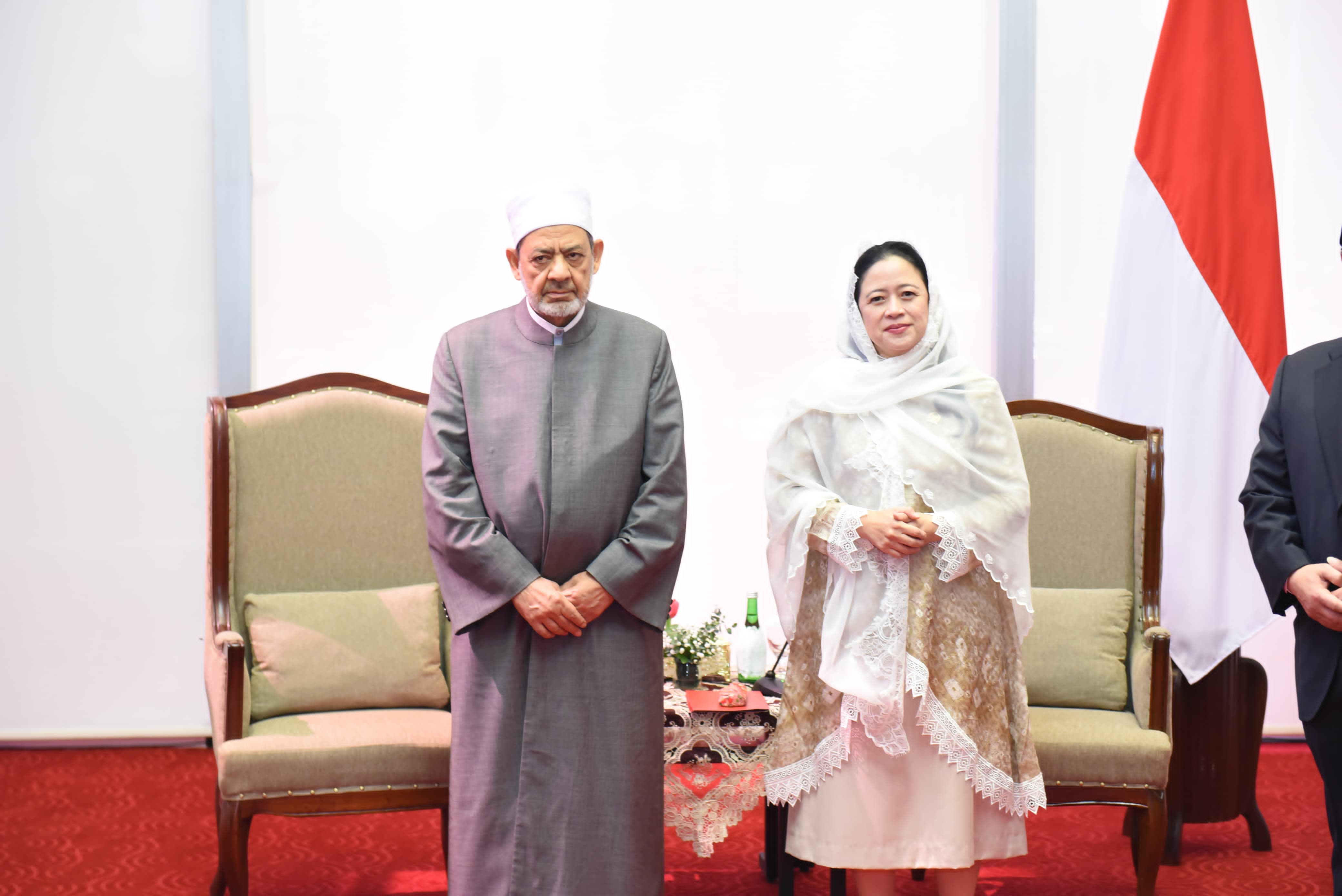Speaker of the Indonesian House of Representatives receives the Grand Imam of Al-Azhar and Chairman of the Muslim Council of Elders, thanking him for his continuous support for women's issues and clarifying Islam's stance on women
Speaker of the Indonesian Parliament: The Grand Imam's visit to the Indonesian Parliament is a support for Indonesian women
Speaker of the Indonesian Parliament: We rely on Al-Azhar to maintain moderation and diversity in our country
Grand Imam of Al-Azhar and Chairman of the Muslim Council of Elders: Indonesia represents a pioneering model in diversity, religious tolerance, and social peace
Grand Imam of Al-Azhar: The exclusion and marginalization of women from social participation is due to the mixing of societal traditions with religious rulings
Puan Maharani, Speaker of Indonesia's House of Representatives, received His Eminence Prof. Dr. Ahmed Al-Tayeb, the Grand Imam of Al-Azhar and Chairman of the Muslim Council of Elders, at the Parliamentary Complex of Indonesia which was established by Sukarno, Indonesia's first president in 1965.
The Speaker expressed her great pleasure at this cherished visit by the Grand Imam to Indonesia and the honor it brings to the Indonesian Parliament. She noted that this visit sends a message from His Eminence supporting Indonesian women amid the spread of incorrect fatwas about women's empowerment and leadership roles, falsely accusing Islam of being anti-women. "As the first woman to chair the House of Representatives of the largest Muslim country, Indonesia, I thank you for your consistent positions that emphasize Islam's respect for women, its preservation of their status, and its elevation of their role as partners and equals with men in all aspects of life," she said.
The Speaker affirmed the Indonesian people's trust in Al-Azhar as a scientific beacon and a moderate religious reference and noted that Al-Azhar's stance against the aggression on Gaza reflects the deep bitterness felt by Indonesians who also look forward to Al-Azhar's continued role in raising awareness of the suffering in Gaza. She emphasized that Indonesia and Al-Azhar share common goals of promoting religious and moral values, combating Islamophobia, and creating global Islamic entities capable of defending Muslim issues on a global level.
She further stated that Indonesia has adopted a path of pluralism, acceptance of others, and providing an environment conducive to mutual coexistence and respect. This approach stems from the belief that diversity is a gift and wisdom from God intended for this universe. She explained that Indonesia relies on Al-Azhar to maintain Islamic moderation in the country, with its graduates and students serving as a soft power to uphold their cohesive social fabric. Hence, Indonesia invests in Indonesians studying at Al-Azhar and has a genuine desire to double their numbers.
For his part, the Grand Imam expressed his happiness at visiting the Indonesian Parliament, highlighting the strong Egyptian-Indonesian relations, noting that Egypt was one of the first countries to support and recognize Indonesia's independence in 1946. He explained that Al-Azhar has been a crucial factor in strengthening these relations, with over 14,000 Indonesian students currently studying at Al-Azhar's institutes and university and that Al-Azhar also offers 200 scholarships, and this number will be increased during this visit in appreciation of the Indonesian people.
The Grand Imam praised Indonesia's development and progress, alongside its commitment to preserving religious and moral values. He noted that Indonesia serves as a pioneering model of pluralism, religious tolerance, and social peace, maintaining stability within the framework of unity. He stressed that the moderation of Islam is the secret to its endurance and distinction, keeping it far from extremism and excess.
His Eminence also emphasized that the history of excluding women and marginalizing their participation in social life is long, rooted in a mix of societal traditions with religious rulings, resulting in biased jurisprudence that hindered women's progress out of fear of societal judgment. He pointed out that proper education and highlighting women's role in building Muslim society alongside men have liberated women from long-standing fears and anxieties.

